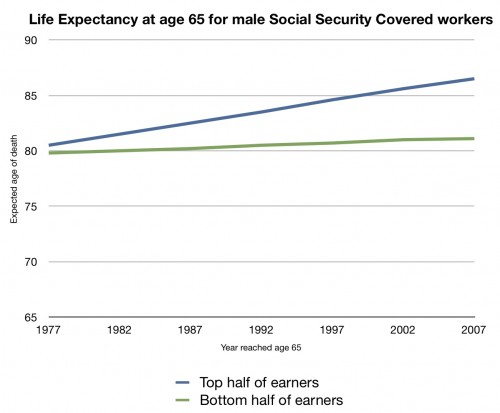Most people in the top half of the income distribution (politicians, pundits, and media) want to reduce Medicare and Social Security expenditures by raising the eligibility age due to the rational that everyone's life expectancy is rising. But this is a way of cutting expenditures that hurts the poorer half of Americans much more than the rich because it is the increasing longevity of the wealthier half that is increasing expenditures. And the poor are more likely to work in physically demanding jobs that cannot be continued at age 65 whereas the more wealthy are more likely to work in cushier jobs that require more education and are easier to continue despite reduced physical strength in old age. Most people think of Medicare as being a progressive program, but it is not. It redistributes from the poor to the rich for two reasons. First, the rich live longer and "by cheating death, the rich collect benefits longer. Secondly, the wealthy demand more intensive use of more expensive medical care. Among individuals over 85, the wealthiest 10%
of the population claim nearly 40% more in Medicare expenditures than
the poorest 10%."
Former Democratic Senator Joe Lieberman and Republican Senator Rand Paul have proposed raising the Medicare age which would make Medicare even more regressive. It would save the government money, but it would raise overall healthcare expenditures because Medicare is more efficient than the private insurance system and despite increased total expenditures, it would increase the number of uninsured Americans. In other words, it would keep taxes low, but it would reduce disposable income more than just keeping Medicare as it is raising taxes to pay for it. Liberal economists like Paul Krugman typically propose the opposite: to increase universal health coverage by expanding Medicare rather than shrinking it. There are many other possibilities too. We could pay for increasing longevity by making medicare less generous for everyone. For example, we could cut the drug benefit that President Bush added or reduce payouts to providers down to the levels that Medicaid pays. None of these ideas are particularly popular.
Former Democratic Senator Joe Lieberman and Republican Senator Rand Paul have proposed raising the Medicare age which would make Medicare even more regressive. It would save the government money, but it would raise overall healthcare expenditures because Medicare is more efficient than the private insurance system and despite increased total expenditures, it would increase the number of uninsured Americans. In other words, it would keep taxes low, but it would reduce disposable income more than just keeping Medicare as it is raising taxes to pay for it. Liberal economists like Paul Krugman typically propose the opposite: to increase universal health coverage by expanding Medicare rather than shrinking it. There are many other possibilities too. We could pay for increasing longevity by making medicare less generous for everyone. For example, we could cut the drug benefit that President Bush added or reduce payouts to providers down to the levels that Medicaid pays. None of these ideas are particularly popular.

No comments:
Post a Comment